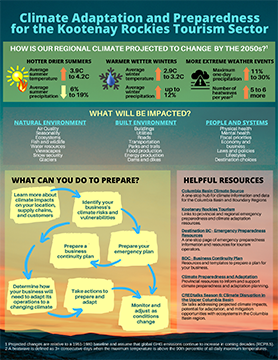Our climate is changing and with the geographic diversity of our region, climate change will affect different areas of the Kootenay Rockies, in different ways.
It is important for tourism operators and stakeholders to understand the range of impacts that climate change can have on an economic, social and environmental scale. These impacts have direct and indirect implications on the tourism industry and they need to be recognized for operators to be prepared and well-equipped with adaptation resources.
Adaptation is essential and implementing preparedness and adaptation strategies can reduce the risk of these impacts to the people, places and resources we cherish in the Kootenay Rockies region and the province of British Columbia.
BC TOURISM CLIMATE RESILIENCY INITIATIVE
Supporting a Climate-Ready Tourism Sector
The BC Tourism Climate Resiliency Initiative is a provincial project that focuses on building a foundational program to support a resilient tourism sector that is prepared to adapt to climate change.
To support sustainability and climate resilience, the BC Tourism Climate Resiliency Initiative (BCTCRI) has launched to help British Columbia’s tourism industry face the impacts of climate change.
The BCTCRI is comprised of four project streams that invest in:
- practical climate adaptation and sustainability planning for tourism businesses,
- micro-grants to help with implementation of climate adaptation and sustainability plans,
- development of a data framework to enable better insight-driven decisions, and
- new province-wide learning and training opportunities.
Project One:
Facilitated Sustainable Tourism and Climate Adaptation Planning for Tourism Businesses
Project One, delivered through the BC Tourism Sustainability Network, provides FREE one-on-one support to tourism businesses looking to incorporate environmental sustainability or climate adaptation measures into their operations, strategy and storytelling.
Businesses accepted into this program will be provided with an experienced Program Advisor and other sustainability and climate adaptation experts from Destination BC’s subject matter expert network. The advisors and experts will work one-on-one with each business to help them develop a sustainability and climate adaptation road map and perform detailed assessments to identify the most impactful, customized measures for climate resiliency. Each plan will include specific examples of expert services and programs, focused on the needs of your business and will be provided at no cost.
The fall intake opened for applications on September 3, 2024 and is still open. (limited space)
Project Two:
Micro-Grant Program to Support Sustainability and Climate Adaptation Plan Implementation
Project Two provides micro-grant funding of up to $15,000 for tourism businesses that are ready to build on their sustainability or climate adaptation plan to implement a project or obtain sustainability certification.
The third intake of Micro-Grant Funding to Support Sustainability and Climate Adaptation Plan implementation was open from January 7-28, 2025.
A BCTCRI Micro-Grant Program Information Session toook place December 16, 2024. Watch the Micro-Grant Info Session Recording.
The second intake of Micro-Grant Funding to Support Sustainability and Climate Adaptation Plan implementation was open from May 13-31, 2024.
A Virtual Information Session took place on May 7, 2024 to learn more about the application process and eligibility criteria.
Project Three launch will take place TBA 2025.
Project Four:
Community Destination Stewardship Initiative – designed to establish a provincial network across BC, enhancing the management of climate resiliency and sustainability within community destinations and the broader tourism industry. The program offers comprehensive learning opportunities through workshops, discussions and other engaging formats, providing communities with essential knowledge and tools. It emphasizes peer-to-peer engagement and the sharing of successes and learnings to promote collaborative growth. Additionally, Project 4 facilitates connections to available resources, programs and initiatives that support sustainable business practices and encourage community engagement.
This initiative seeks to advance the sustainable development of BC’s tourism industry by offering educational opportunities and facilitating peer connections and discussions.
It equips communities with the capabilities to adopt and implement sustainable tourism practices, support partners and local businesses in responding to climate emergencies and preparedness and reducing the impacts of extreme weather events and long-term climate impacts.
Project Four included this Workshop Series
for eligible network participants:
March 26, 2025:
Climate Resilience for CDMOs,
Tackling the Challenge of our Century
February 19, 2025:
Marketing & Storytelling
January 22, 2025:
Climate Resilience, Governance & CDMOs
October 16, 2024:
De-carbonization and Climate Action
September 18:
Climate Resilience & Indigenous Knowledge
July 17:
Regenerative Tourism & Systems Thinking
June 19:
Climate Resilience and Disaster Preparedness.
May 22:
Setting the Stage: Destination Stewardship in BC.
CLIMATE RISK, PREPAREDNESS AND ADAPTATION WORKSHOP
Columbia Basin climate change professionals, Ingrid Liepa and Mel Reasoner have offered this workshop on climate impacts and preparedness for tourism operators in the Kootenay Rockies region.
The valued and popular workshop will be offered again –
check back for next workshop date.
(Most recently offered April 2023)
- The presentation & discussion includes:
- How is the climate in the Kootenay Rockies changing? What’s projected and what does that mean for tourism businesses?
- Seasonal impacts such as wildfires, smoky skies and snowpack, and what to be planning for.
- What is industry doing and how can you start to implement your own practices?
- What is the province doing and how to best align.
CLIMATE CHANGE HOW-TO GUIDE
A resource for industry, business and professional associations to help their members become climate change leaders. It contains background information, business rational for responding to climate change, tips on overcoming challenges; examples and best practices.
The guide is intended for those involved in the strategic direction of their associations but others will still find this document valuable.

COLUMBIA BASIN CLIMATE SOURCE
The Columbia Basin-Boundary region is already experiencing a climate that is different from 50 years ago and it continues to change. Communities across the region are demonstrating ways to apart and reduce greenhouse gas emissions for our ecosystems and our way-of-life to thrive. The Columbia Basin Climate Source is your one-stop destination for information on climate change, impacts and action with this region.
MINISTRY OF ENVIRONMENT & CLIMATE CHANGE STRATEGY
Preparing for climate change strengthens our ability to respond to extreme events such as wildfires, flooding and heatwaves, as well as more gradual changes like water shortages and sea level rise.
BC’s Climate Preparedness and Adaptation Strategy helps to protect ecosystems, lower long-term costs and keep people and communities safe.


